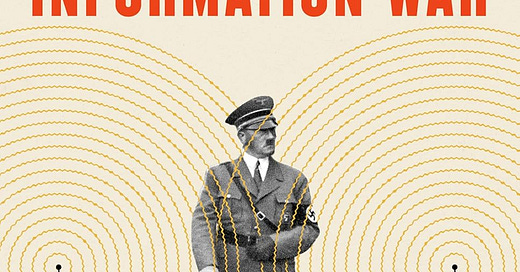How to Win an Information War: The Propagandist Who Outwitted Hitler by Peter Pomerantsev (PublicAffairs, 2024).
Many works of popular history—especially books on World War II—zero in on one particular figure whose work made a greater difference than most people realized. They do this with varying degrees of success; Sonia Purnell, for instance, made a profoundly convincing case for Virginia Hall’s significance in the ironically titled A Woman of No Importance, but not nearly as convincing a case for Pamela Churchill Harriman’s in her follow-up book, Kingmaker.
In How to Win an Information War, Peter Pomerantsev appears to follow the same formula, but appearances can be deceiving—as his subject, British propagandist Sefton Delmer, would have been the first to point out. Pomerantsev takes a clear-eyed approach to Delmer’s work and legacy, dispassionately evaluating his virtues and flaws while mining his ideas for what they have they have to offer us today.
Delmer’s upbringing uniquely suited him for a career in propaganda. As a child, he lived with his family in Germany, where his father taught English literature at Berlin University. When World War I broke out, the Delmer family quickly found themselves in a precarious situation. Surrounded by ostentatious shows of German pride, young Sefton came to realize the truth expressed by philosopher Jacques Ellul: “Propaganda is the true remedy for loneliness.” The parades and chants and flags everywhere gave Germans a common cause, something bigger than themselves to get caught up in. But these things also turned them against outsiders, as one vulnerable young British boy learned all too well. Vulnerable in more ways than one—Sefton himself felt the pull of the German propaganda even though his own home country was on the opposing side. He knew firsthand what it was like to feel the loneliness Ellul described, that desperate yearning to belong.
Years later, as World War II approached, Delmer’s insider knowledge of Germany opened doors for him, first to get to know some of the highest Nazi officials, and then to take what he’d learned about them and get himself a job with British intelligence.
Borrowing from the theories of English psychoanalyst Roger Money-Kyrle, Pomerantsev argues, “Hitler’s power stemmed not so much from his ability to win people over with clever arguments, but from his articulating the feelings that already lay within them and taking them on an emotional journey from feeling humiliated to humiliating others.” Effective propaganda, in other words, is all about understanding and manipulating emotions, particularly a sense of perpetual grievance. It’s a truth that Delmer would put to good use as he sought to turn the Nazis’ propaganda against them.
Working with teams made up of everyone from British officials to German refugees, Delmer carefully tailored his radio broadcasts and pamphlets based on what he knew about the psychology of the Germans under Hitler. A colorful figure with a boundless imagination, Delmer used a variety of techniques and devices, from the sentimental to the salacious to the truly disgusting, to slip under the Germans’ guard, turn them against their leaders, and nudge them to start thinking in different ways. It was an arduous task, and there was little solid feedback to show whether it was working, but Delmer felt richly rewarded every time a report came in of German soldiers or civilians or POWs credulously repeating some story he’d made up, or even better, acting on false information he’d circulated.
Despite the implications of his book’s title and subtitle, Pomerantsev acknowledges that we don’t have nearly enough evidence to prove that Delmer’s work made a major difference to the outcome of the war. For that matter, Delmer himself wasn’t sure it had. At times he even worried that it might have done more harm than good. But as Pomerantsev makes clear, mental poison of the kind that the Nazis were spewing is powerful stuff that takes endless patience and creativity to get rid of, and Delmer had those qualities in spades. So his efforts are worth studying in a world where such poison keeps resurfacing, no matter how many times we think we’ve defeated it.
For Ukrainian-born Pomerantsev, the issue is deeply personal. Walking through ruined areas of his homeland in recent years and talking with people who lost everything, he traces the devastation, at least in large part, to the relentless stream of lies fed to the Russians by their government and media. The propaganda that dehumanized the Ukrainians allowed Russian troops to rape, torture, and murder them without a qualm. Those are the stakes, and that’s why Pomerantsev believes it’s so important to have all hands on deck in the fight against such propaganda, including and especially the Sefton Delmers of the world.
The glimpses we get of Delmer and his associates as they created their broadcasts and pamphlets are so intriguing, I would have liked a lot more stories of their brainstorming, performing, pranks, quarrels, and day-to-day life. But that’s not really the point of the book. As I indicated earlier, Pomerantsev isn’t here to give us just one more person-who-secretly-changed-the-course-of-the-war story. He’s interested in finding and sharing timeless truths that matter deeply to every generation, and that’s what makes his book immensely valuable.
(Cover image copyright PublicAffairs.)
Book Links:
How to Win an Information War on Amazon
How to Win an Information War on Bookshop
(Note: As an Amazon Associate I earn from qualifying purchases.)
Goodreads Reviews:
Crisis Averted by Caitlin Rivers
The Favorites by Layne Fargo
Kingmaker by Sonia Purnell
Living in Wonder by Rod Dreher
Repeat Performance by William O’Farrell
Once a Castle by Sarah Arthur
The Cost of Control by Sharon Hodde Miller
The Scholar and the Last Faerie Door by H. G. Parry
The Mortal and Immortal Life of the Girl from Milan by Domenico Starnone
The Barn by Wright Thompson



